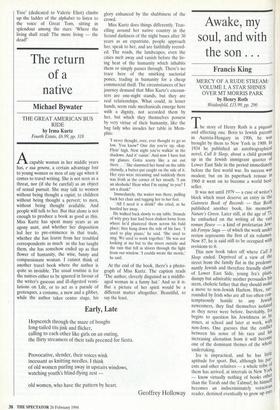The return of a native
Michael Bywater
THE GREAT AMERICAN BUS RIDE by Irma Kurtz Fourth Estate, £6.99, pp. 318 Acapable woman in her middle years has, e sua genera, a certain advantage lost to young women or men of any age when it comes to travel writing. She is not seen as a threat, nor (if she be careful) as an object of sexual pursuit. She may talk to women without being thought a rapist; to children without being thought a pervert; to men, without being thought available. And people will talk to her. But that alone is not enough to produce a book as good as this. Miss Kurtz has spent many years as an agony aunt, and whether her disposition led her to pre-eminence in that trade, whether she has learnt from her troubled correspondents as much as she has taught them, she has somehow ended up as that flower of humanity, the wise, funny and compassionate woman. I cannot think of another travel book where the author is quite so invisible. The usual routine is for the natives either to be ignored in favour of the writer's gaseous and ill-digested venti- lations on Life, or to act as a parade of grotesques, a costume, a mew and a gibber, while the author takes centre stage, his
glory enhanced by the shabbiness of the crowd.
Miss Kurtz does things differently. Trav- elling around her native country in the fecund darkness of the night buses after 30 years as an expatriate, people approach her, speak to her, and are faithfully record- ed. The roads, the landscapes, even the cities melt away and vanish before the liv- ing heat of the humanity which inhabits them or simply passes through. There's no trace here of the smirking auctorial ponce, trading in humanity for a cheap commercial thrill. The circumstances of her journey demand that Miss Kurtz's encoun- ters are one-night stands, but they are real relationships. What could, in lesser hands, seem rude mechanicals emerge here with a dignity, not accorded them by her, but which they themselves possess by very virtue of their humanity, like the bag lady who invades her table in Mem- phis:
'I never thought, ever, ever thought to go so low. You know? One day you're up, okay. Flyin' high. Next night you're walkin' in the shadows. And it' rainin'. And now I have lost my glasses. Gotta scurry like a rat out there ...' She slammed her hand on the table clumsily, a butter-pat caught on the side of it. Her eyes were streaming and suddenly there was froth at the corner of her mouth. 'I am an alcoholic! Hear what I'm saying' to you? I am a drunk!'
Immediately, the waiter was there, pulling back her chair and tugging her to her feet.
'All I need is a drink!' she cried, as he hustled her away.
He walked back slowly to my table. Strands of wiry grey hair had been shaken loose from where he'd plastered them across his bald place; they hung down the side of his face. 'I used to play piano,' he said. 'She used to sing. We used to work together.' He was not looking at me but to the street outside and the rain that fell in slivers through the light from our window. 'I coulda wrote the movie,' he said.
At the end of the book, there's a photo- graph of Miss Kurtz. The caption reads 'The author, cleverly disguised as a middle- aged woman in a funny hat.' And so it is. But a picture of her spirit would be a different matter altogether. Beautiful, to say the least.


























































 Previous page
Previous page